How Newborn Kittens Survive without a Mother Cat: Essential Care Tips.
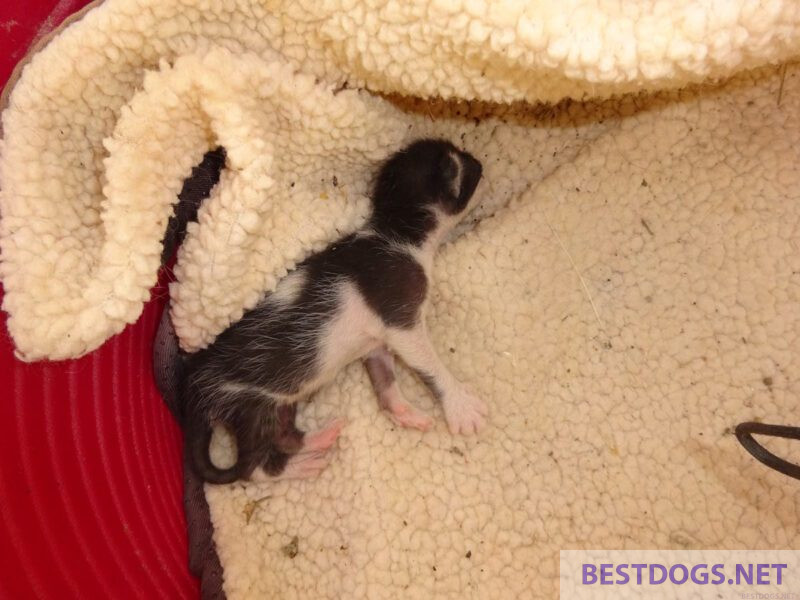
I recently found a lonely kitten, less than a week old, lying on the flagstones in the middle of the front garden in the brooding sun. I can’t explain how it got there.
After an initial feeding with a small plastic lace and ordinary milk and being placed in a cat box lined with blankets, the little rascal survived the first night. Fortunately, the next day he was adopted by experienced human ‘mother cat’ Lydia Flinn from VV Cats of Crete and taken away to be reared. The happy little man’s name is now ‘Sam’.
How Newborn Kittens Survive without a Mother Cat: Essential Care Tips
Table of Contents
Caring for a newborn kitten without a mother presents unique challenges, but with the proper knowledge and tools, these kittens can thrive.
Newborn kittens are extremely vulnerable because they rely entirely on their mother for warmth, nutrition, and early-stage development. In the absence of the mother cat, a caregiver must step in to fill these roles.
Ensuring that the kittens stay warm is critical as they are unable to regulate their body temperature for the first few weeks of life.
Feeding is another critical aspect that requires close attention.
Newborn kittens need to be fed a suitable milk replacement formula with a frequency that mimics natural feeding from a mother cat.
Around the clock care is needed, as these tiny creatures must be fed every two to three hours.
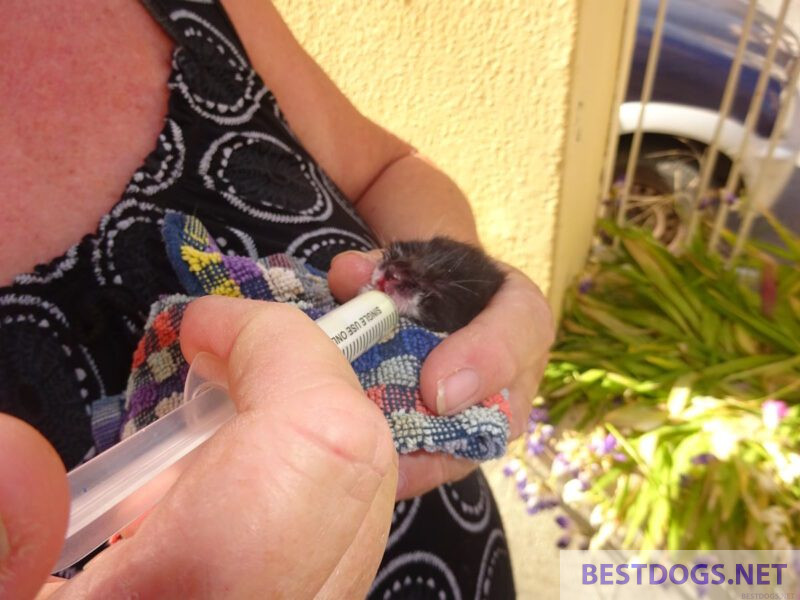
Moreover, stimulating them to urinate and defecate is an important part of the routine, a task their mother would naturally perform.
While the task may seem daunting, individuals who find themselves as surrogate caregivers should be reassured that with diligence and proper care, newborn kittens can grow into healthy and happy cats.
Knowledge about the proper rearing of orphaned kittens is widely available and can empower caregivers to successfully nurture these delicate lives through their most vulnerable stages.
Assessing the Needs of Newborn Kittens
Properly assessing the needs of newborn kittens is crucial for their survival in the absence of a mother cat.
They require careful age determination, health evaluations, and a suitable environment that caters specifically to their delicate state.
Determining Kitten Age
To appropriately care for orphaned kittens, one must accurately determine their age, as their developmental stage dictates the specific care they need.
A kitten’s eye opening status and development of teeth are reliable indicators: kittens typically open their eyes between 7-10 days of age, and deciduous teeth appear at approximately 3 weeks of age.
Health Evaluation
Each kitten should undergo a thorough health evaluation by a veterinarian shortly after being found.
A health check will focus on identifying congenital defects, presence of parasites, and signs of infection. Ensuring the kittens are properly hydrated is also vital, as dehydration can quickly become life-threatening.
Key Health Indicators to Monitor
- Breathing: Should be regular and unlabored.
- Hydration: Perform a skin turgor test by gently lifting the skin.
- Weight: Regular weighing is essential to monitor growth rate.
Environmental Requirements
The environment for orphaned newborn kittens should mimic the warmth and security provided by a mother cat.
They are unable to regulate their body temperature, so maintaining an ambient environmental temperature between 85-90°F in the first week, which can be gradually reduced as they age, is critical.
Shelters for the kittens should be clean, dry, and draft-free, with comfortable bedding to nestle in.
Proper bedding is crucial for warmth and comfort, ensuring bedding is changed regularly to maintain cleanliness.
Optimal Environmental Setup:
- Warmth: Use heat lamps or heating pads with adjustable settings.
- Bedding: Soft, non-looped fabric to prevent nails from snagging.
- Safety: Ensure the area is enclosed, free from hazards.
Providing Proper Nutrition
Proper nutrition is crucial for the survival of newborn kittens without a mother.
They require a specific balance of nutrients found in mother’s milk, which must be replicated as closely as possible for optimal health and growth.
Choosing the Right Formula
One must choose a high-quality kitten milk replacer that closely matches the nutrient profile of the mother cat’s milk.
It is essential to avoid feeding kittens cow’s milk or other types of milk not formulated for kittens, as these can cause digestive upset and lack the necessary nutrients.
Kitten milk replacement formula is the best feeding option, designed to provide all the required vitamins and minerals.
Feeding Techniques and Schedule
Kittens should be fed using a feeding bottle with specially designed nipples that mimic the mother cat’s teat.
In the early stages, they must be fed every 2-3 hours, including overnight.
To avoid health issues, careful attention must be given to proper feeding techniques, ensuring the kitten is on its stomach in a natural feeding position—not on its back—to prevent aspiration.
Regular feeding intervals will also support steady growth and development.
Weaning onto Solid Food
The weaning process typically begins around four to five weeks of age.
This is when kittens can start transitioning to solid food by mixing kitten formula with high-quality, soft kitten food to create a gruel.
Gradually, one should reduce the amount of formula in the mixture to help kittens adapt to solely eating solid food.
By eight weeks, most kittens are able to eat solid food on their own and no longer require milk replacer.
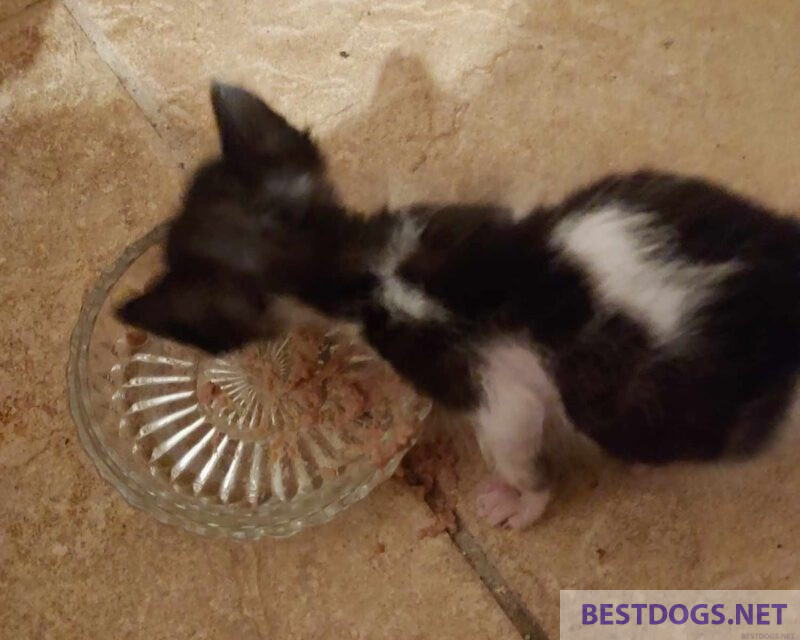
Creating a Safe and Warm Environment
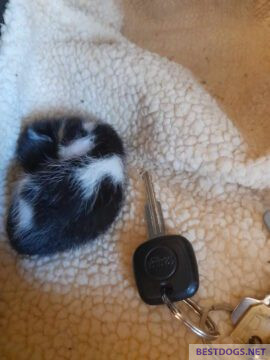
For newborn kittens to thrive without a mother, their living space must be carefully crafted to mimic the warmth and security provided by their mother.
Heat is a critical factor in their survival, and a well-defined living area ensures they remain protected and comfortable.
Setting Up Living Space
When arranging a living space for newborn kittens, it is imperative to choose a secure area that is free from drafts and potential hazards.
The space should include soft, clean bedding such as fleece blankets that can comfortably cushion the kittens.
They require a space that is both small enough to retain heat but large enough to allow them to move and grow.
Maintaining Adequate Heat
Newborn kittens lack the ability to regulate their own body temperature, making external heat sources essential.
A heating pad set on low, placed underneath half of the bedding, allows kittens to move towards the warmth as needed.
The ambient temperature should be kept around 85-90°F in the first week, gradually lowering to 80°F as they grow.
Monitoring temperature with a reliable thermometer prevents overheating or chilling, both of which can be detrimental to the kittens’ health.
Regular checks ensure the environment remains consistently warm and that fresh water is at hand to aid in hydration and overall wellbeing.
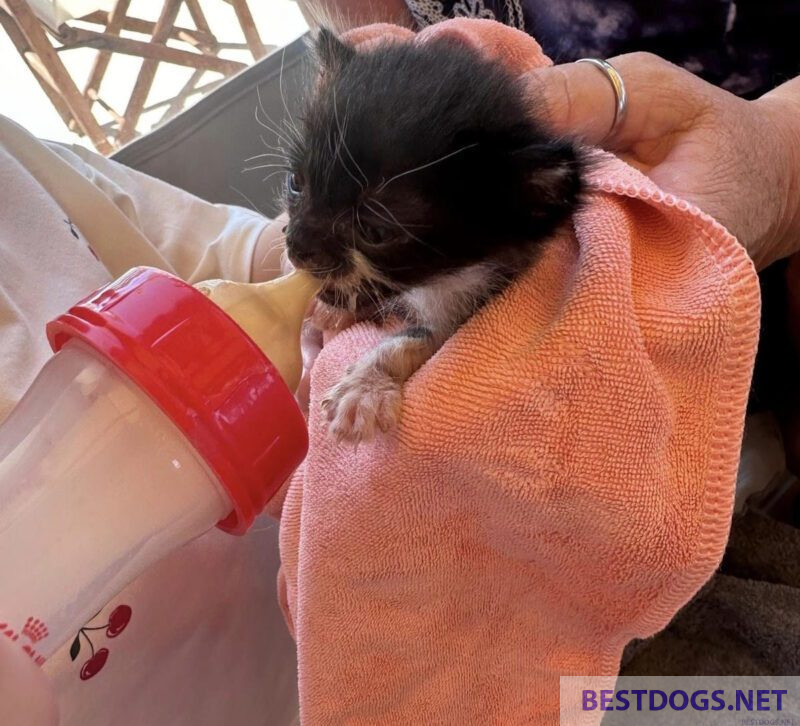
Health Care and Hygiene
The health and hygiene of orphaned newborn kittens are crucial for their survival.
They require diligent care to manage health issues and maintain hygiene to ward off infections and facilitate healthy growth.
Managing Common Health Issues
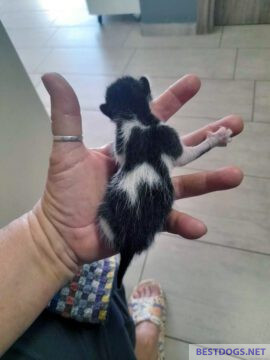
Orphaned kittens may face several health challenges, especially in the absence of their mother’s immunity-boosting milk.
Veterinary checkups are essential in the first few weeks to monitor their health.
Vaccinations should be administered according to a schedule provided by the vet to protect against common feline diseases.
Diarrhea is a frequent issue in newborns and could be a sign of parasites or infections. Immediate veterinary attention can help diagnose and treat these problems early on.
Deworming medications may be necessary to rid the kittens of parasites like fleas and internal worms, which is vital for their health.
Hygiene and Warmth
Maintaining a clean environment is crucial for orphaned kittens to prevent diseases.
Bedding should be changed regularly, and the area should be kept free of waste to promote cleanliness.
To simulate the mother’s role in elimination, one must gently stimulate the kittens’ abdomens to help them urinate and defecate after feeding.
Hygiene also involves keeping kittens at a proper temperature, because they cannot regulate their body heat for the first few weeks.
A warm but not hot heating pad wrapped in a blanket can help, ensuring they can move away if it’s too warm.
A vet can provide specific guidance on keeping orphaned kittens warm and hygienic so they can thrive.
Rearing and Socialization
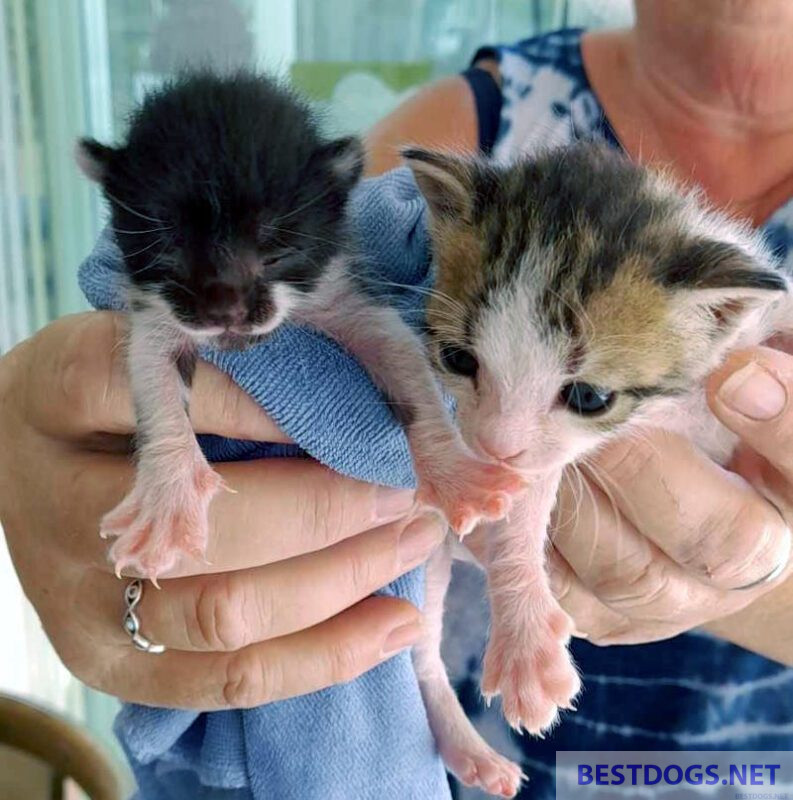
Raising orphaned kittens involves providing not only round-the-clock care for their survival but also focusing on their social development.
A caregiver must take on the role of the missing mom and introduce kittens to the necessary skills that will help them thrive in homes with humans and other pets.
Fostering Social Skills
Socialization is a crucial aspect of kitten care that ensures kittens become well-adjusted adults.
From the age of 2-7 weeks, orphaned kittens require exposure to various stimuli including human interaction, different sounds, and gentle handling by caregivers.
This early handling by humans helps kitten’s build trust and reduces fear, preparing them for successful integration into a family environment.
Incorporating positive exposures with food and play can also fortify their social connections.
Litter Box Training
Training to use the litter box is an essential component of kitten rearing.
Starting as early as three weeks old, kittens can begin to learn litter box habits, which are vital for cleanliness and adaptability.
The caregiver can encourage this behavior by placing kittens in the litter box after feeding times and naps, making sure the box is easily accessible and filled with non-clumping litter that is safe for the kitten’s delicate system.
Consistent practice will guide them to develop the necessary habits for proper hygiene and acclimation to future living spaces.
Preparing for Adoption or Long-term Care
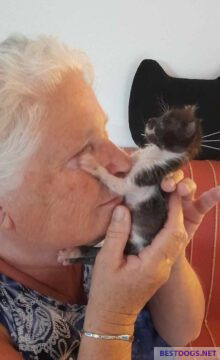
When preparing for the adoption or long-term care of newborn kittens without a mother, it is essential for a caregiver to create a nurturing environment.
Shelters often have protocols in place and can guide novice caregivers through this process.
- Warmth: A constant source of heat is crucial for kittens’ survival.
- A heating pad wrapped in a towel can serve as a substitute for the mother’s warmth.
- Feeding: Newborn kittens require bottle feeding with a kitten milk replacer every two to three hours.
- Hygiene: The caregiver must stimulate the kittens’ elimination by gently wiping their abdomens with a soft, damp cloth.
It is also important to consult with a veterinarian early on to schedule necessary vaccinations and to ensure the kittens maintain a healthy development trajectory.
Animal shelters and experienced caregivers can often provide additional resources such as caregiving supplies and educational materials.
Caregivers should:
- Establish a quiet, secluded space for the kittens.
- Keep meticulous records of feeding, weight, and health.
- Socialize kittens to various stimuli to prepare them for future homes.
Before adoption:
- Screen potential adopters thoroughly.
- Ensure kittens are spayed or neutered, if age-appropriate, to prevent future overpopulation.
Veterinarians are vital partners in preparing kittens for adoption or long-term care, providing expert advice on nutrition, health monitoring, and spay or neuter surgeries.
With diligent care, even without their mother, kittens can grow to be happy and healthy adult cats.
Frequently Asked Questions
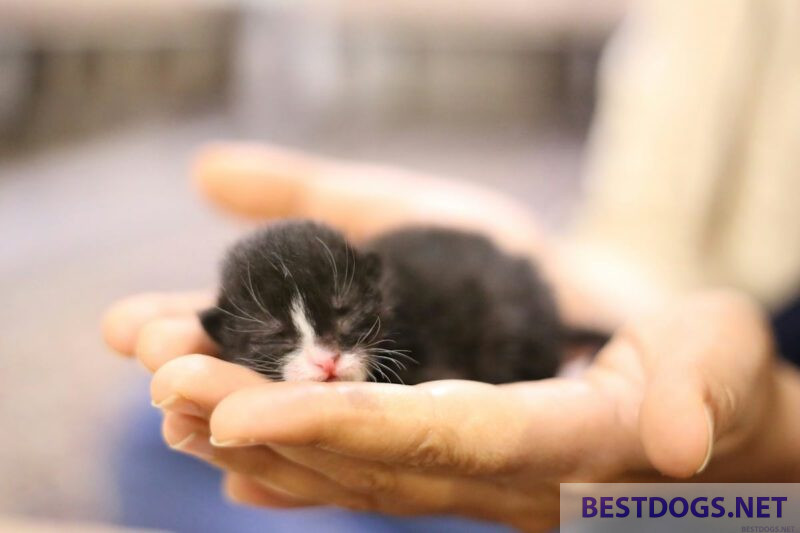
In raising orphaned kittens, one must provide meticulous care in feeding, warmth, and early socialization to ensure their healthy development.
What measures should be taken to feed newborn kittens in the absence of a mother cat?
Newborn kittens require a special formula as they cannot digest regular cow’s milk.
One should use a kitten milk replacer and feed it with a bottle designed for kittens. The feeding should be done every two to three hours for kittens under two weeks of age.
What are the key developmental milestones for orphaned kittens up to 8 weeks old?
Orphaned kittens should open their eyes by 7 to 10 days and will start crawling at about two weeks.
Around three weeks, they begin to walk, and by four weeks, kittens should be introduced to kitten food.
Litter training starts around the same time and by eight weeks, they should be eating solid food and using the litter box consistently.
How can you keep a newborn kitten warm without its mother?
Creating a warm environment is crucial.
One can use a heating pad wrapped in a blanket, making sure there’s space for the kitten to move away if it becomes too warm.
This source of warmth is particularly vital until the kitten is 4 to 6 weeks old, as they cannot regulate their body temperature.
What are the signs that a newborn kitten may require immediate veterinary attention?
Immediate veterinary attention is required if a kitten is excessively crying, which can indicate hunger or distress, or if there is a lack of sucking reflex.
Other warning signs include labored breathing, weakness, lethargy, or if the kitten feels cold to the touch.
How often do orphaned newborn kittens need to be fed, and what feeding techniques should be used?
Orphaned newborn kittens will require feeding approximately every 2-3 hours, including during the night.
A small bottle with a nipple designed for kittens should be used, and one must ensure the milk is warm, not hot.
Stimulating the kitten to urinate and defecate after each feeding is essential, as they cannot do this on their own.
What steps can be taken to socialize newborn kittens who are being raised without a mother?
Socialization for kittens without a mother entails handling them gently and frequently to get them used to human contact.
After the kittens open their eyes, they should be exposed to a variety of people, safe environments, and other pets to become well-adjusted and socialized cats.


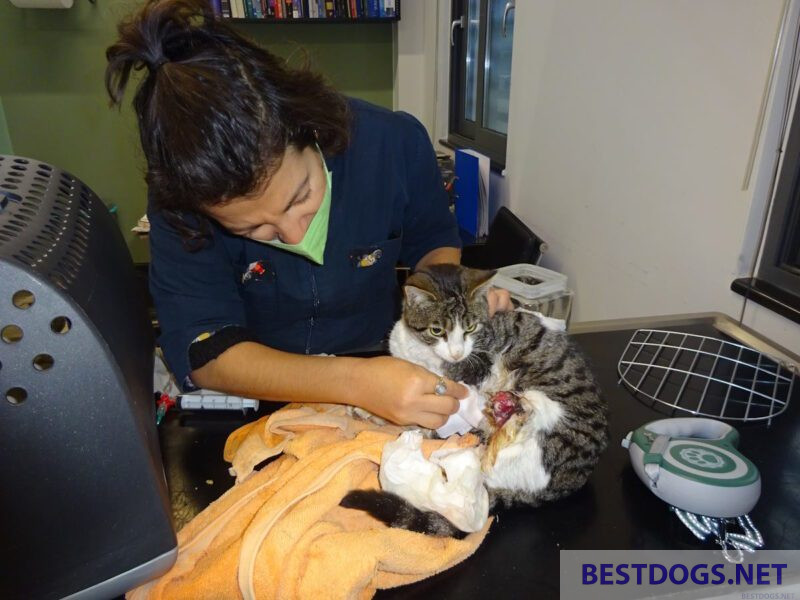

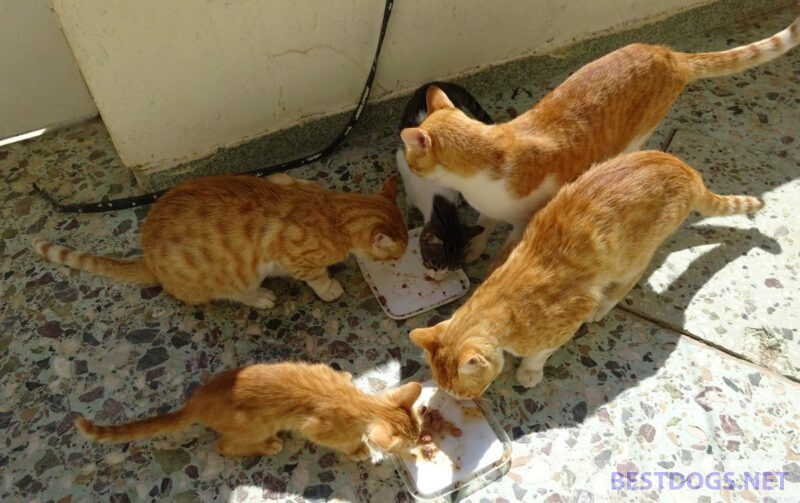
Thank you for sharing Sam’s heartwarming story and the essential care tips for orphaned kittens. Your experience highlights the critical need for immediate intervention when a newborn kitten is found, especially in regulating their body temperature and providing proper nutrition. Many people don’t realize how fragile kittens are in their first few hours and how quickly their health can deteriorate without maternal warmth and colostrum.
In addition to the great advice provided here, it’s also important to emphasize the role of early hydration and the dangers of dehydration, which can set in rapidly. A quick skin turgor test, as you mentioned, is a valuable tool for caregivers to assess hydration status. Also, keeping emergency supplies like kitten formula and a feeding syringe on hand can be lifesaving in such situations.
For those looking to dive deeper into emergency kitten care, including feeding schedules and common warning signs, I’ve written an in-depth guide that might be helpful: [https://catsom.com/how-long-can-a-newborn-kitten-survive-without-its-mother/]. It covers practical steps to ensure a kitten’s survival and long-term health.
Your post is an excellent resource, and I hope Sam continues to thrive! Have you found any particular feeding techniques that worked best during his early weeks?
Hi! Thanks for your hints and reading the story. As mentioned, little Sam he was adopted by experienced human ‘mother cat’ Lydia Flinn from VV Cats of Crete and is still fine. For more actual information, please contact Lydia via here linked Facebook profile!